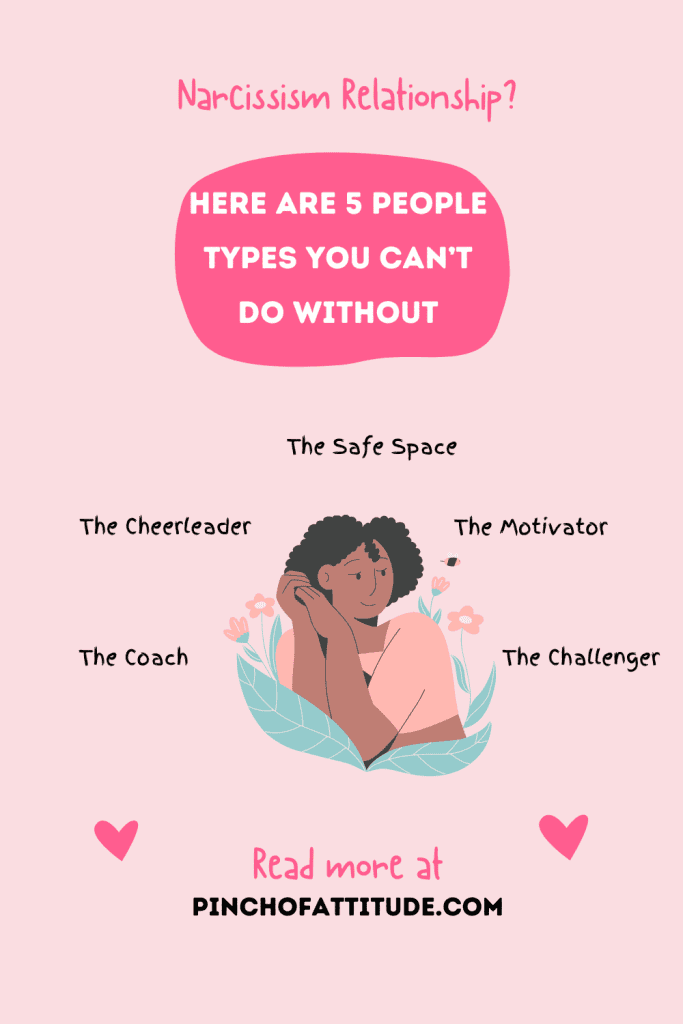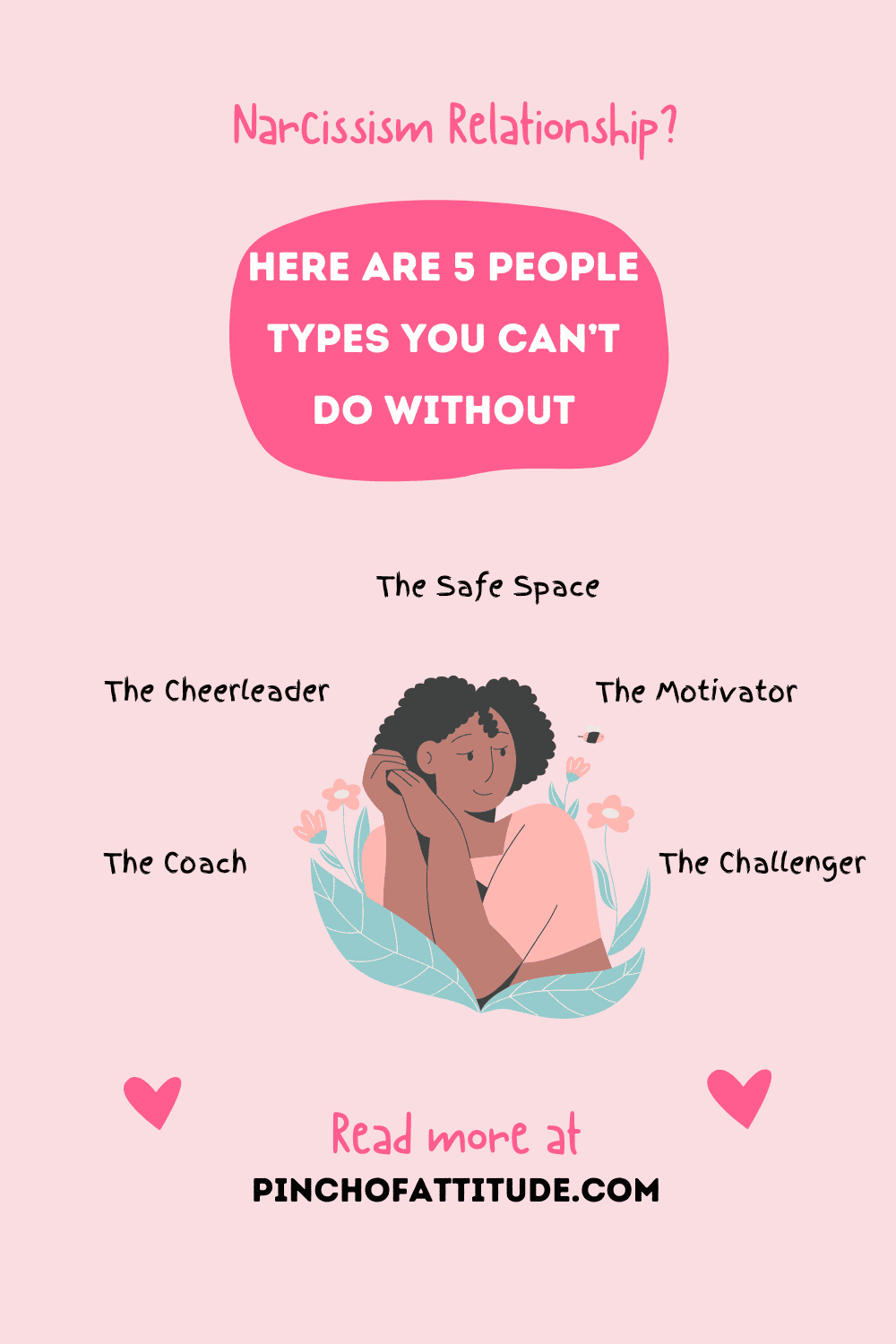When you’re healing from narcissistic abuse, the journey can feel like a lonely, uphill battle. But here’s the truth: You don’t have to go through it alone. In fact, the people you surround yourself with during this time can either make or break your progress.
Imagine them as your personal army, each with a unique role in helping you navigate the emotional landmines and self-doubt that often follow such toxic relationships.
But, of course, not just any random crowd will do. It would help if you had the right mix of people, those who bring out the best in you, hold you accountable, and remind you of your worth.
Below, I’ll break down the five types of people you absolutely need in your corner while healing from narcissistic abuse. Let’s dive in!
- Surrounding yourself with the right types of people is crucial for effectively healing from narcissistic abuse.
- Identifying and engaging with individuals who provide safety, motivation, challenge, guidance, and encouragement can significantly enhance your recovery journey.
- Healing is not a solo journey; building a supportive network that evolves with you is essential for long-term growth and resilience.
Table of Contents
The Safe Space

Healing from narcissistic abuse is no walk in the park, and it requires a space where you feel completely safe—both physically and emotionally. Enter “The Safe Space” person.
This is the friend who makes you feel like you can finally take off the heavy armor you’ve been wearing for so long. You know, the person you can ugly-cry in front of, share your weirdest thoughts with, or even sit in comfortable silence.
This person doesn’t judge; they protect. They’re your emotional bodyguard, ready to fend off any negative energy that tries to sneak into your healing bubble. They remind you that it’s okay to let your guard down, to be vulnerable, and most importantly, to just be you. No filters, no pretending.

Why You Need Them: You’ve been on edge for so long, likely walking on eggshells and doubting your every move. The Safe Space is where you relearn what it feels like to be comfortable in your own skin.
The Motivator

Do you know those days when getting out of bed felt like a monumental task? That’s when you need The Motivator. This person is like your personal cheerleader on steroids—someone who is always a few steps ahead of you in life but never hesitates to pull you up alongside them. They inspire you not just with words but by example.
This person is living proof that life after narcissistic abuse is awesome. Their energy is infectious, and they have this uncanny ability to make you believe that you, too, can conquer the world. They keep you focused on what’s possible, even when your energy is at its lowest.
Why You Need Them: Healing is exhausting, and the path can often feel like it’s going nowhere. The Motivator’s job is to keep your eyes on the prize and remind you that the best is yet to come.
The Challenger

Healing isn’t just about cozy blankets and affirmations. Sometimes, you need someone to kick you in the ass. That’s where The Challenger comes in. This person isn’t here to tell you what you want to hear—they’re here to tell you what you need to hear. They’re not afraid to call you out on your bullshit, and yeah, it might sting a little.
But here’s the thing: They do it because they care. The Challenger is committed to your growth, even if it means making you uncomfortable.
They force you to face those blind spots you’ve been ignoring, and they push you to confront the hard truths about your healing journey. They are your accountability partner, the one who makes sure you don’t settle for mediocrity.
Why You Need Them: The path to healing is often blocked by our own self-deception. The Challenger helps you break through those barriers, making sure you’re not just surviving, but thriving.
The Coach

While The Challenger questions you, The Coach pushes you. This person is like that tough-as-nails personal trainer who won’t let you slack off, no matter how much you want to. They see your potential, probably even more than you do—and they’re not about to let you waste it.
The Coach gets you out of your comfort zone, encouraging you to try new things, make bold moves, and face your fears head-on.
They’re not here for your excuses. If you say you want to heal, The Coach is going to hold you to that. They’re the person you call when you need a nudge (or a shove) to take that next step.
Why You Need Them: Comfort zones are nice, but nothing grows there. The Coach ensures that you keep moving forward, even when the journey feels impossible.
The Cheerleader

Let’s not forget The Cheerleader, the person who’s always in your corner, waving those pom-poms high and shouting your praises from the rooftops.
This is the friend who believes in you even when you don’t believe in yourself. They’re your biggest fan, the one who’s always there to remind you of how far you’ve come, not just how far you have to go.
The Cheerleader’s positivity is contagious. They’re the first to send you an encouraging text, the one who always knows just what to say to lift your spirits.
In the darkest moments, The Cheerleader is the light that keeps you going. They’re your constant reminder that you’re not alone in this.
Why You Need Them: Healing from narcissistic abuse can be a lonely process, but The Cheerleader makes sure you never forget that you have a whole team rooting for your success.
How You Can Identify These People in Your Life?

Ok, so the next big question is: how do you actually identify these people in your life? It’s not like people walk around with labels on their foreheads saying, “Hey, I’m your Motivator!”
The truth is, it takes a bit of introspection and observation to figure out who fits into these essential roles. Let’s break it down:
1. Look at Their Actions, Not Just Their Words
One of the biggest lessons you learn after dealing with a narcissist is that actions speak louder than words. This is your chance to put that lesson into practice.
When you think about your Safe Space, Motivator, Challenger, Coach, or Cheerleader, don’t just consider what they say to you—pay attention to what they do.
- The Safe Space: Who do you feel totally at ease with? Who has consistently been there for you when you needed a shoulder to cry on or just someone to sit quietly with you? This person doesn’t make you feel judged or pressured; they make you feel safe just by being there.
- The Motivator: Who’s that one friend who always seems to have their life together—or at least gives off that vibe? This person doesn’t necessarily have to be a motivational speaker, but they inspire you by living their truth. They’re the ones who make you think, “If they can do it, so can I.”
- The Challenger: Who’s the friend who isn’t afraid to call you out on your excuses? This person might make you squirm a little, but deep down, you know they’re pushing you because they care. They’re not here to sugarcoat things—they’re here to help you grow.
- The Coach: Who’s the friend that always seems to have a plan? This person is the one pushing you to step outside your comfort zone. They might drag you to that yoga class or insist you finally try therapy, but they do it because they see potential in you that you might not see in yourself.
- The Cheerleader: Who’s always got your back, no matter what? This person is the one who sends you those “You got this!” texts or shows up with ice cream when you’ve had a bad day. They’re your biggest fans, always ready to lift you up when you’re feeling down.
2. Reflect on Your Past Interactions
Sometimes, the best way to identify these people is to think back to how they’ve been there for you in the past. Who was there during your toughest moments? Who celebrated your wins, no matter how small? Who gave you that tough love when you needed it?
The people who consistently show up for you—whether it’s in times of crisis or moments of joy—are likely the ones who will fit into these roles. Consistency is a big deal here. It’s not about the friend who’s there every once in a while; it’s about the one who’s proven themselves to be reliable over time.
3. Trust Your Gut
You’ve been through a lot, and one thing narcissistic abuse might have taught you is to doubt your intuition. But guess what? Your gut is still there, and it’s pretty darn powerful. When you think about the people in your life, pay attention to how they make you feel on a gut level.
After spending time with someone, do you feel drained or energized? The people you’re identifying should leave you feeling better, not worse. If someone leaves you feeling emotionally exhausted, they’re probably not the right fit for your healing team.
4. Communicate Your Needs
Once you’ve got an idea of who these people might be, it’s crucial to communicate your needs. Remember, they’re not mind readers. If you need someone to be your Challenger or your Safe Space, let them know. Most people will appreciate the clarity and will likely rise to the occasion.
Be open about what you need from them. This clarity helps them support you in the way you need, and it prevents any misunderstandings down the road.
5. Don’t Be Afraid to Adjust
As you heal, you might find that the roles these people play in your life shift. Maybe your Motivator becomes your Coach, or your Safe Space evolves into your Cheerleader. That’s completely normal. Healing is a dynamic process, and your support network will naturally evolve as you do.
If someone doesn’t fit into a specific role anymore, that’s okay. Don’t force it. Instead, allow your relationships to grow and change as you do. What’s most important is that you continue to surround yourself with people who uplift and support your healing journey.
Related Posts:
Frequently Asked Questions
Who should I surround myself with during narcissistic abuse healing?
Surround yourself with people who provide safety, motivation, challenge, guidance, and encouragement.
Why is it important to have a strong support system during healing?
A strong support system accelerates your recovery by providing emotional safety and pushing you toward growth.
How do I identify the right people for my healing journey?
Identify the right people by observing their actions, trusting your gut, and reflecting on how they’ve supported you in the past.
What if I don’t have these supportive people in my life?
If you don’t have these people, consider joining support groups or seeking therapy to build a strong, supportive network.
Can my healing journey change the roles people play in my life?
Yes, as you heal, the roles these people play may evolve, and that’s a normal part of the recovery process.





I’m not boasting I promise, but as far as the 5 people you need, I am all 5. I’ve helped numerous women and even a couple men leave narcissistic relationships successfully. They still reach out years later to thank me for saving their lives. I do this out of the kindness of my heart, not for accolades. I wouldn’t wish a narcissist upon anyone and I’ve been around them since birth (49 yo in a week). I’m not in a relationship with one now. Been single 10 years. But I have children with two of them. The idea of having 5 different people to aid victims during this time is unreachable for most especially these days when there are barely any decent people left. Id say find a good one and keep them close ❤️